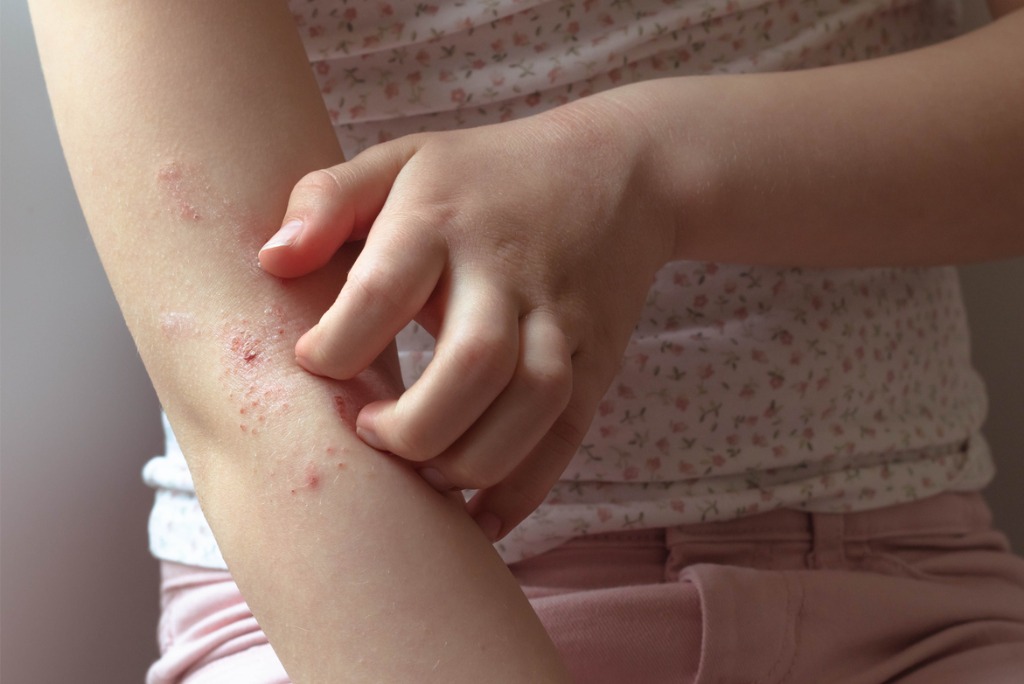Psoriasis and eczema are both chronic conditions that can affect children and adults alike. While these conditions may be similar, there are some distinguishing characteristics. Knowing the difference between pediatric psoriasis and eczema may help you get the correct diagnosis for your child and help them find relief. While these conditions cannot be cured, there are treatments available that may lessen the symptoms. In addition, clinical research may provide new information and breakthrough treatments.
What is Pediatric Psoriasis?
About one-third of people with psoriasis develop it during childhood, and pediatric psoriasis may appear as early as infancy. This skin condition is a chronic inflammatory disease that affects the skin, joints, and nails. Pediatric psoriasis may look different than adult psoriasis, and the condition typically comes and goes in cycles.
Symptoms of Pediatric Psoriasis
The symptoms of pediatric psoriasis may vary depending on the severity and type of psoriasis. The most common type of psoriasis is plaque psoriasis, which may be passed down genetically. Common symptoms of psoriasis in children include:
- Itchy and sore patches of skin that are red or scaly
- Thickened, pitted, or ridged nails
- Swollen and stiff joints
- Dry, cracked skin that may bleed
- A burning or stinging sensation on the skin
Children with psoriasis may have a higher risk of obesity, hypertension, rheumatoid arthritis, Crohn’s disease, and diabetes mellitus. Furthermore, psychiatric conditions such as anxiety and depression are also more common in children with psoriasis. Therefore finding treatment options that may help lessen the symptoms is important.
Treatment Options for Pediatric Psoriasis
There is no cure for psoriasis, but there are treatments available that reduce symptoms and prevent the frequency of flare-ups. The goal of treatment is to stop the skin cells from growing so quickly, reduce inflammation, and remove scales. You may need to try several treatments before finding the one that works best for your child. Common treatment options include:
- Topical treatments such as creams, lotions, or ointments
- Phototherapy, which uses ultraviolet light to slow down the growth of skin cells
- Systemic treatments that are taken by mouth or injection
- Biologic drugs that are created from living cells and target a specific part of the immune system
Before starting any treatment, it is essential to talk to your child’s doctor about the potential risks and benefits. Your child’s pediatrician will also be able to provide you with more information about pediatric psoriasis and the available treatment options.
What is Pediatric Eczema?
Eczema affects approximately 30% of the US population and mainly affects infants and children. Unlike psoriasis, eczema is not an autoinflammatory disease but rather a chronic skin condition. Pediatric eczema is thought to be caused by genetic and environmental factors. About 30% of children with eczema have a food allergy, and many children may develop asthma or hay fever.
Symptoms of Pediatric Eczema
In infants, eczema typically appears on the face, scalp, arms, and legs. Older children may notice eczema symptoms occur on the insides of the elbows or on the back of the knees. In some severe cases, eczema may cover most of the body. The main difference between eczema and psoriasis is that psoriasis presents thick scales with well-defined borders while eczema typically does not.
Common eczema symptoms include:
- Dry, itchy skin
- Red rashes
- Bumps on the skin
- Leathery patches of skin
- Raw skin from scratching
- Swelling
Similar to psoriasis, eczema may also be associated with other conditions such as anxiety, stress, and depression. Insomnia, allergies, and asthma may also be more common in children with eczema. Additionally, eczema may be extremely itchy, which often causes children to scratch the affected areas. However, it is best to avoid scratching the skin to prevent blisters or sores from developing.
Treatment Options for Pediatric Eczema
Like psoriasis, there is no cure for eczema. However, there are treatments available to lessen symptoms and prevent flare-ups. Reducing stress, avoiding triggers, and keeping the skin moisturized play a vital role in managing eczema. In some cases, your child’s doctor may also prescribe medication.
Common treatments for eczema include:
- Using a humidifier to add moisture to the air
- Creams and ointments to soothe and moisturize the skin
- Taking oatmeal baths
- Avoiding dressing your child in wool, silk, or other irritating fabrics.
- Avoiding long, hot showers or baths as this may dry out the skin.
Ask your pediatrician about what treatment options are best for your child. They may be able to recommend specific products or prescribe medication. Moreover, be aware of soaps, detergents, or other products that may trigger your child’s eczema flare-ups and avoid using them.
The Benefits of Clinical Research for Pediatric Dermatology Conditions
Although there is currently no cure for either psoriasis or eczema, clinical research is constantly working to develop new and improved treatments. By participating in a clinical research study, your child may gain access to the latest treatments and therapies while also playing an important role in advancing medical knowledge. These studies are done under the supervision of a licensed physician and are conducted with the safety of participants in mind.
Participate in a Study at Olympian Clinical Research
Olympian Clinical Research is dedicated to improving the lives of children with chronic conditions such as psoriasis and eczema. We are currently enrolling patients in a number of research studies focused on discovering new treatments for common conditions like psoriasis and eczema. A complete list of our current studies may be found here. If you are interested in learning more about participating in our current studies, please contact us today and see if you or your child qualify.

Recent Comments